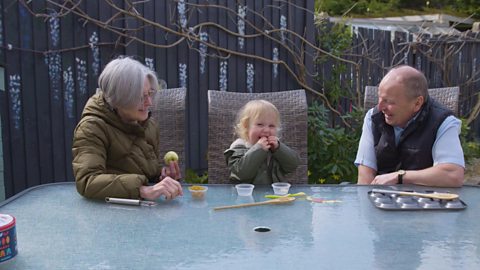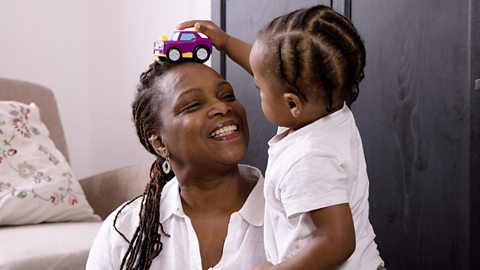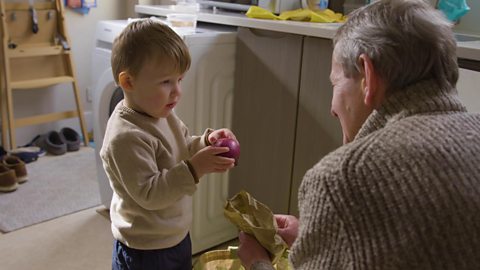Whether it’s feeding, weaning, sleeping or your grandchild’s behaviour, you may sometimes find yourself questioning some of your children’s parenting choices.
It may be that they do things a little differently to how you did it with them. Or they could be following new advice that you aren’t so sure about.
Or maybe you’re just worried that they sometimes seem to be struggling to juggle parenting with other parts of their life.
But should you step in and offer your opinions?
We spoke to Dee Holmes, a relationship counsellor at Relate and proud grandparent herself, to get her tips on how grandparents should approach giving parenting advice.
Letting your kids find their own way as parents
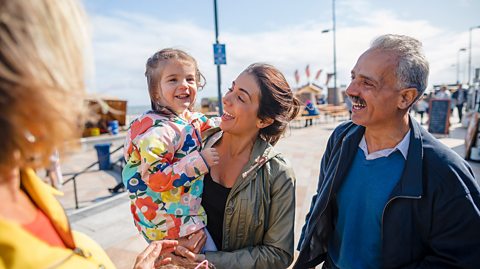
When it comes to giving advice to their kids, it can be tempting for grandparents to rush in and impart their wisdom.
After all, there might be a technique you swore by to get them off to sleep each night, or maybe you used to be a master at calming crying fits. And of course, you don’t want to see your children wrestling with these things if you think you have a solution. But Dee stresses that it’s best to try and allow your child to find their own way as a parent.
“As a counsellor, when clients come to us, they often want us to give advice. But actually, that's not what counts, it's about getting people to find their own answers to questions.
“I think the same applies when you're a grandparent giving advice. It is about trying to trigger their thinking process.
“My daughter might say to me, ‘I had a really bad night - the baby woke up three times and I couldn't settle her.’ And there could be a temptation to think ‘oh she's asking me for some sleep advice here’. But is she? The response should really be ‘Oh, you know that sounds like a tough night, have you had any thoughts about how you might make tonight better?’ Or ‘what have you done in the past that might have worked? or just ‘what are you thinking of doing?’”

When to give parenting advice as a grandparent
“Sometimes you might find they come back and ask ‘what did you do when that happened with us? How did you manage that?’” says Dee.
But taking this moment to pause and question whether your child is actually seeking your advice is key to avoiding overstepping the line.
It’s important to remember that, while you think you may be being helpful by offering suggestions, if your child is under pressure it can sometimes be hard for them not to take those suggestions as criticisms.
Think about it - if you're in the middle of cooking and your partner comes in and says ‘Oh, I think you should cook the potatoes this way’, you would look at them as if to say ‘who asked you?!’.
“I would say that walking in and giving unsolicited advice is an absolute no-no, it's not going to go down well. Check out whether they want advice. Are they telling you about the problems they are having and just want a listening ear, or are they actually asking you?”
How to give advice as a grandparent

Once you’ve established that your child is open to your parenting advice, Dee stresses the need for grandparents to accept the limitations of their knowledge and be tentative in the guidance they give.
Always be mindful that unless you are a trained paediatrician, we're only experts in the parenting we've done.
She emphasises that every child is different, so the things that worked with them may not work for their own children.
“I think people who've had 4, 5 or 6 children would say that they were all very different and one size doesn't fit all. The advice you give may not work, or may not work for that child, or may not be the best thing in this situation.”
You must also be mindful of how, years on from your time as a parent, your child’s situation and lifestyle may not be the same as yours was as a parent. “When you’re giving advice, think how this might work in their context - it might have worked in your context, but how's it going to work if things are different?”
Not only that, but times have changed for parents in terms of the amount of information available to them and their access to the latest knowledge and expert advice. The latest guidance may also differ significantly to the advice you received in the past.
“Be very mindful of how things have changed. I try to ask about that and take an interest in where the information is coming from.”

Putting yourself in their shoes
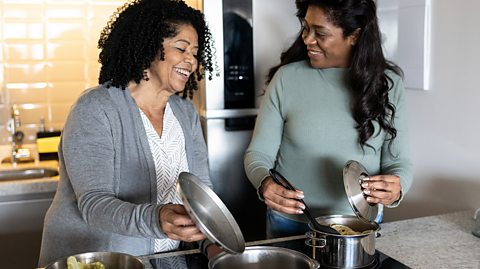
A key part to being supportive of your child in their parenting journey is to think back on what it was like for you as a parent. And importantly, try not to put on rose-tinted glasses.“Remember that you do fade out the bad stuff. I can look back now on 31 years of parenting, and I know there were sleepless nights, but that isn’t what stands out. And it's interesting how it hits me when my daughter says to me that ‘I was up three times last night’. I seem to remember that absolutely awful feeling then, but I don't most of the time.”
Grandparents have got to be aware that their role is not just being grandparents to the child, but also part of a support system for the parents.
And sometimes this is less about offering parenting advice and more about what practical support you can give.
“Think about what might have been supportive for you as a parent. I think a lot of grandparents come in and want to just do the baby bit all the time - it could be that you can help out by coming in and unloading the dishwasher for them,” she reminds us.

What to do if your parenting advice is taken the wrong way
You’re bound to sometimes say things that upset your child, and in this case, Dee recommends having an open and honest conversation with them about it.
“It is about trying to bring those things out into the open. Saying ‘I've been thinking about that conversation we had, and I wonder if I was a bit too negative, or I was a bit too forceful in my opinion? I wonder if I might have offended you by saying that you should do that?’ and allowing them to then give you a response and let you know if they’re upset and why. It's hard for people not to accept an apology if you give some explanation around it and are willing to take on board what you've got wrong.”

